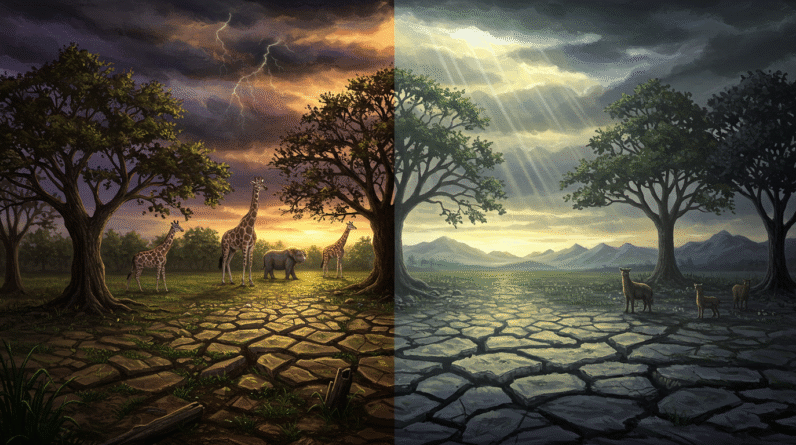Creation Declares God’s Glory (Psalm 19:1)
You’ve likely heard the simple, powerful statement of Scripture: “The heavens declare the glory of God; the skies proclaim the work of his hands.” That’s Psalm 19:1, and it’s one of those brief verses that opens a door to a whole room of wonder. When you pause to look up — whether in a city park, on a country road, or while lying awake at night — you’re standing before a living sermon. The heavens don’t use words the way you and I do, yet they speak continually and clearly about their Maker. Read it for yourself here: Psalm 19:1.
When David wrote these words, he was doing more than admiring scenery. He was reminding you and me that the created order is not neutral noise; it’s a testimony. The skies testify to God’s glory in ways that connect with the heart. If you’ll let them, they’ll teach you to worship. And as you take this in, you’re not left alone to interpret the spectacle — Scripture gives you a lens, a context, and a call to respond.
The voice of creation in Psalm 19
Psalm 19 does more than inaugurate a thought. Verses 1–6 paint a vivid scene: the heavens, the day, the night, the sun as a bridegroom or champion, rejoicing and traveling across the sky to complete its circuit. The text makes an unmistakable point — creation is active in declaring God’s glory. Read the fuller passage here: Psalm 19:1-6.
You ought to notice the clarity and universality of that declaration. There’s no language barrier in the cosmos. No one can say, “I didn’t get the message.” The continual testimony of day and night speaks to every human heart. When you’re willing to hear, creation becomes a daily pulpit, preaching the greatness of God in rhythms you can trace and patterns you can understand.
Creation’s witness in Paul’s letter to the Romans
The apostle Paul echoes and expands on this idea when he tells you that God’s invisible qualities — his eternal power and divine nature — are clearly seen in what has been made. That means that looking at the world rightly leads to knowledge of God. Paul’s words are direct and pastoral, reminding you that nature provides a testimony you cannot evade: Romans 1:20.
This truth carries pastoral urgency. If God’s attributes are plain in creation, then your responsibility to seek and honor Him is just as plain. Paul’s concern is not merely academic. He warns that when you suppress that truth, other problems follow. So the clear evidence in the created order is meant to point you back to the Creator — not to leave you admiring the work and ignoring the worker.
From Genesis onward: God as Creator
You’ll do well to start at the beginning. The Bible opens with a definitive statement: “In the beginning God created the heavens and the earth.” That foundational claim is the anchor for everything Scripture has to say about God, humanity, and the world: Genesis 1:1.
When you accept that opening line, creation becomes a revelation. The contours of mountains, the vast rhythm of seasons, the small intricacy of a leaf — all of it belongs to God’s creative speech. Genesis tells you that creation is not random or self-explanatory apart from the Creator. Every line of Scripture that follows assumes God’s hand in making and sustaining the universe, and therefore creation’s glory is never accidental but intentional.
Job: Scripture’s natural theologian
If you’re looking for a model of someone who learned theology by considering the earth, read Job. In the midst of suffering and debate, Job urges you to look to the animals and the environment and learn from them. “Ask the animals, and they will teach you,” he says, and points to God’s wisdom displayed in their ways: Job 12:7-10.
Job’s example is helpful because it shows you how humility before creation can lead to wisdom about God. The world itself becomes a teacher when you stop imagining that your viewpoint is the only valid one. The rocks, birds, and beasts aren’t a substitute for Scripture, but they reinforce what Scripture says about God’s care, wisdom, and provision. They remind you that the Creator is intimately involved in what He made.
Isaiah’s call to lift your eyes
The prophet Isaiah invites you to “lift up your eyes” and look at the order of the heavens — the multitude of stars, the constellations — and to consider God’s power. He challenges you to set aside fear and thoughts of weakness by reflecting on the magnitude of the Creator who names each star: Isaiah 40:26.
When you reflect on that divine capacity, your perspective shifts. Problems that seem overwhelming are placed under the care of One who not only created but also sustains. Isaiah’s poetic urging helps you move from anxiety to trust, from smallness to a correct, reverent awareness of God’s majesty.
The Psalmist’s wonder in Psalm 8
Another Psalm strikes a similar note but approaches it from the vantage of human dignity. Psalm 8 begins and ends in praise, marveling that the One who made the heavens would also be mindful of you. It raises a question you must take seriously: why would the Creator care to crown you with glory and honor? Read this beautiful reflection here: Psalm 8.
This amazement should shape your identity. If the heavens declare God’s glory and God is mindful of you, then your life has profound significance. You’re not an accident in an uncaring cosmos; you’re placed and intended for a purpose. This biblical perspective transforms the way you approach vocation, relationships, and worship.
Jesus Christ and the creative word
The New Testament makes an even greater connection. The Gospel of John identifies Jesus as the Word through whom all things were made. That means your encounter with creation leads you ultimately to Christ: John 1:1-3.
When you look at creation, remember that it points beyond itself to Jesus, who is both the agent of creation and the one who reveals the Father. He is the radiance of God’s glory, the exact representation of His being, as Hebrews puts it: Hebrews 1:1-3. So the testimony of the world is not merely philosophical; it is Christologically centered. When creation declares God’s glory, it ultimately declares the glory of the Son, who sustains all things by his powerful word.
Colossians: Christ preeminent over creation
Paul in Colossians builds on this to insist on Christ’s preeminence: everything — visible and invisible — was created through Him and for Him, and He holds all things together: Colossians 1:15-17.
This is not abstract theology. It means that when you see order in nature, you’re seeing the fingerprints of a Savior who is involved in every detail. Whether it’s the rotation of a galaxy or the chemistry that sustains cells, Christ’s sustaining work gives you reason not only to wonder but to trust. Your worship of Him is thus grounded in the reality that He is intimately connected to every layer of creation.

Creation and conscience: God’s moral law in nature
The created world also plays a role in your moral understanding. Paul argues in Romans that aspects of God’s law are written on human hearts, and nature’s testimony supports that inner knowledge. In other words, creation helps set the moral stage for human responsibility: Romans 2:14-15.
This truth matters because it means worship and obedience are not merely cultural options but expected responses to the God revealed everywhere. If creation declares God’s glory, then refusing to honor Him is a moral failure with consequences. You’re called to respond with reverence, not indifference.
When creation groans: the fallen world and the promise of redemption
You should also notice that God’s good creation is not as it should be. Scripture teaches that the creation itself waits in eager expectation for the children of God to be revealed, and it groans as it awaits redemption: Romans 8:19-22.
This groaning helps you understand the brokenness you see — natural disasters, ecological distress, disease, and decay. They’re not evidence of God’s absence but of a world under disharmony, awaiting the day when Christ will renew all things. That hope makes your creation care an act of faith as you steward what God has entrusted to you.
Stewardship: your role in God’s good world
Genesis doesn’t stop at creation; it entrusts creation to your care. God placed humanity in the garden to work it and take care of it: Genesis 2:15.
You’re given stewardship, which is as much a spiritual responsibility as a practical one. Stewardship means you care for the poor and vulnerable, tend the fields, protect biodiversity, and steward resources with humility. It’s not optional; it’s part of reflecting God’s character as Creator and Lord. When you manage God’s gifts faithfully, you participate in the ongoing testimony of creation to His glory.
Science and faith: harmonious friends
You might feel a tension between scientific discovery and faith, but Scripture and true science are not enemies. When science reveals intricate design, you’re simply discovering more of what God made. Paul’s logic in Romans and David’s praise in the Psalms both assume that the created order is intelligible and ordered — not random. That gives you every reason to pursue knowledge, responsibly and humbly, as you learn more about the Creator’s handiwork.
Good science leads to worship when you interpret findings within a biblical worldview. Whether you’re studying biology, astronomy, geology, or climate science, your pursuit becomes an act of reverence if it directs you to praise the One who spoke and continues to speak all things into being.
Worship as the proper response
If creation declares God’s glory, then worship is the natural reply. The Psalmist closes Psalm 19 by asking that the words of his mouth and the meditation of his heart would be pleasing to God. That prayer is for you, too. When you let creation point you to God, your prayer, song, and life should align with that revelation: Psalm 19:14.
Worship is both communal and personal. You’re invited to join with the saints and with all creatures in praising God. Your worship should be informed by Scripture, enlivened by gratitude for creation’s testimony, and expressed through faithful living that honors the Creator in every sphere of life.
The Gospel completes creation’s testimony
Creation’s voice is clear, but it’s not sufficient to bring you to full reconciliation with God. Nature reveals God’s character and his existence, but it does not remove your need for salvation through Christ. The Gospel explains that though creation declares God’s glory, humanity has rebelled and needs redemption. Scripture is direct about your condition and God’s provision in Christ: “For all have sinned and fall short of the glory of God,” and “the wages of sin are death, but the gift of God is eternal life in Christ Jesus our Lord.” See these verses here: Romans 3:23 and Romans 6:23.
You’re invited to receive Christ by faith. Paul gives a simple, clear call to turn and confess Christ as Lord and believe in your heart that God raised Him from the dead: Romans 10:9-10. Creation brings you to the door; the Gospel opens that door and brings you into a relationship with the One who made the heavens and the earth.
Practical ways to hear creation’s voice
You may wonder how to respond day by day. First, be intentional about noticing. If you spend time outdoors, you allow your soul to listen. Quiet observation — watching a sunrise, walking through a wood, or gazing at the stars — cultivates a heart that can hear God’s whisper.
Second, read Scripture as you observe. Let Genesis, the Psalms, Isaiah, and the New Testament inform your interpretation. Scripture and creation together help you see the full picture. Third, let your wonder lead to worship and action. Worship through prayer and song, and act by caring for creation and serving others. Each of these practices helps you align with God’s intended testimony in the world.
The church’s role in pointing people to the Creator
The church has a unique task in helping you and others see how creation declares God’s glory. Preaching, teaching, and discipleship should connect God’s Word to the world God made. When pastors, teachers, and congregations place Scripture and nature together before people, they faithfully mirror Psalm 19’s intent.
This means churches should also be engaged in creation care, scientific literacy, and public witness that draws both mind and heart to God. When the church fails to connect faith and the natural world, it misses a profound opportunity to display God’s glory.
The hope of a new creation
The Bible ends not with despair but with promise. Revelation affirms that in the consummation of history, God will make all things new and that He is worthy of praise for creating and redeeming. The vision includes the praise of every creature, indicating that the testimony of creation will reach its intended fulfillment: Revelation 4:11.
This future hope encourages you to live with perspective. The world’s beauties are not to be worshiped as gods; they’re a foreshadowing of the Creator’s glory. They point you toward the day when heaven and earth will be reconciled under Christ, and every element of creation will perfectly reflect God’s goodness.
How can you respond today
You can respond now in several simple, honest ways. Begin by acknowledging God as Creator in your prayers and songs. Let your awe deepen into trust, your observation into obedience. If you’ve never asked Christ to be your Savior, the testimony of creation is meant to drive you toward the Gospel — to confess your need and to receive grace.
If you’re already a believer, allow creation to renew your worship and your commitments to stewardship. Use your gifts — whatever they may be — to care for God’s world, to teach others about the Creator, and to support ministries that bring the Gospel to all nations and steward creation wisely.
Concluding encouragement
You’ve been given eyes to see and a heart to respond. Psalm 19 begins with the heavens declaring God’s glory, and it ends with a prayer for words and thoughts that honor Him. Let your life be the bridge between those two points. Let the wonder of the skies and the beauty of the earth lift you to worship, and let that worship be lived out in faithful obedience to the One who made you and loves you.
If you’re moved by this truth and you want to take the next step toward Christ, remember the simplicity and clarity of Scripture’s invitation: confess and believe. If you want to talk through this personally, seek a pastor, a friend in your church, or reach out to a trusted Christian brother or sister who can help guide you.
If God has stirred your heart while you read, I encourage you to let that stir lead to prayer. Say simply, “Lord, I believe you made the heavens and the earth. I recognize my need of You. Please forgive me, come into my life, and help me live for Your glory.” God hears such prayers.
If you’d like to meditate further on these truths, revisit Psalm 19 and the other passages cited here, letting Scripture and creation together shape your worship and witness.
Explore More
For further reading and encouragement, check out these posts:
👉 7 Bible Verses About Faith in Hard Times
👉 Job’s Faith: What We Can Learn From His Trials
👉 How To Trust God When Everything Falls Apart
👉 Why God Allows Suffering – A Biblical Perspective
👉 Faith Over Fear: How To Stand Strong In Uncertain Seasons
👉 How To Encourage Someone Struggling With Their Faith
👉 5 Prayers for Strength When You’re Feeling Weak

📘 Jesus and the Woman Caught in Adultery – Grace and Mercy Over Judgement
A powerful retelling of John 8:1-11. This book brings to life the depth of forgiveness, mercy, and God’s unwavering love.
👉 Check it now on Amazon
As a ClickBank & Amazon Affiliate, I earn from qualifying purchases.
Acknowledgment: All Bible verses referenced in this article were accessed via Bible Gateway (or Bible Hub).
“Want to explore more? Check out our latest post on Why Jesus? and discover the life-changing truth of the Gospel!”








